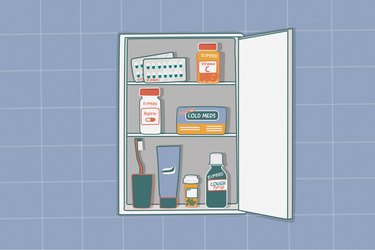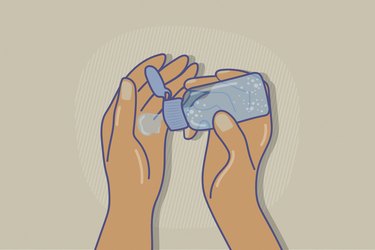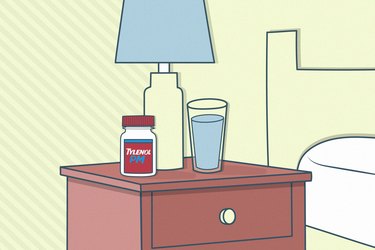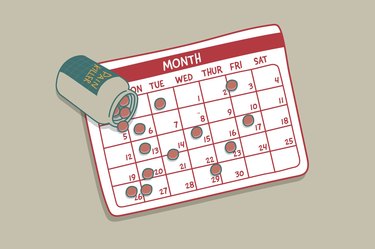
Maybe your head is throbbing at the end of the day. Maybe you twisted your ankle while jogging. Or perhaps you're cramping up during your monthly flow. If you're like a lot of people, your first line of defense against aches and pains is to pop an over-the-counter pain reliever, like ibuprofen.
An estimated 15 percent of Americans take store-bought pain meds regularly, according to Harvard Health Publishing, and the market is supposed to reach $24.4 billion by 2027, up from $15.6 billion in 2019, according to market research from Fortune Business Insights.
Video of the Day
Video of the Day
Although painkillers can be helpful when used as directed, many of us don't bother to read the label or stick to the parameters.
A January 2018 study in Pharmacoepidemiology & Drug Safety of more than 1,300 over-the-counter ibuprofen users found 11 percent took more than the recommended dose, often without knowing it.
"People think this medicine is safe, since you can buy it at any grocery store, pharmacy or gas station," says pain management expert Lynn Webster, MD, author of The Painful Truth.
That easy access might lead you to assume that it's NBD if you don't follow the instructions to a T. But in fact, you could face some pretty serious side effects if you swallow more than you're supposed to.
What Are Over-the-Counter Pain Relievers, Exactly?
The majority of pain meds that you see at the pharmacy belong to a class of drugs called NSAIDs, an acronym that stands for nonsteroidal anti-inflammatory drugs.
NSAIDs are among the most commonly used medications in the world and include aspirin, naproxen (the active ingredient in Aleve) and ibuprofen (found in Advil and Motrin), among others. (Acetaminophen, or Tylenol, is not an NSAID.)
NSAIDs have three principal properties: "They reduce pain, inflammation and fever," says gastroenterologist Byron Cryer, MD, chief of internal medicine at Baylor University, who has researched the GI toxicity of NSAIDs. "They are indicated for short-term pain relief."
Think: an acute musculoskeletal injury like a sprained wrist, throwing your back out or dysmenorrhea (pain associated with your menstrual cycle). In other words, you're supposed to take them for a brief period of time while in discomfort, and then stop once you recover.
"NSAIDs are generally safe and effective as long as they are taken within the recommended dosage and time period on the label," Dr. Cryer says.
For example, a bottle of ibuprofen instructs you to take one to two 200-milligram tablets every four to six hours, for a maximum of 1,200 milligrams in a 24-hour period, according to the U.S. Food and Drug Administration (FDA). The label also stipulates you can use the medicine for up to 10 days (unless your health care provider advises you otherwise).
"Still, it's common for folks to run to the pharmacy when they have a symptom and tear through a bottle of medicine without reading what is on the package," Dr. Cryer says. "But the reason you want to limit the amount and duration is that no medications, including NSAIDs, are without risk — the more you take and the longer you take it for, the greater your risk."
Allow us to elaborate.
NSAIDs Might Cause Intestinal Bleeding

The principal side effect of too many NSAIDs is ulcers — bleeding in the stomach or digestive tract.
"In order to abate inflammation and pain, NSAIDs reduce prostaglandins, which are a substance in the stomach that protects against injury, including ulcer formation," Dr. Cryer says.
Lower levels of prostaglandins increase the likelihood of intestinal bleeding.
If you have stomach upset or pain, you feel faint, you're vomiting blood or your stools turn black, stop taking NSAIDs and go see your doctor — these are common symptoms of intestinal bleeding.
"Many times, stopping the NSAID is sufficient to get rid of the ulcer, but if there is a complication you might need other meds, like an acid-reducer, to heal it," Dr. Cryer says.
Certain types of people are at greater risk of developing ulcers. If you are older than 65, have a history of ulcers, are taking a blood thinner or corticosteroid (like prednisone) or drink alcohol regularly, ask your physician before taking an NSAID, according to Mount Sinai. The chance of intestinal bleeding is low if you only take NSAIDs intermittently.
And by the way, the FDA cautions against using NSAIDs if you have had an allergic reaction to a pain reliever or fever reducer, or right before or after heart surgery.
They Can Put You at Risk for Heart Disease and Stroke
With the exception of aspirin, NSAIDs can increase your risk of heart attack or stroke within a few weeks, although it's not clear why this happens. Your risk might rise the longer you use NSAIDs, according to the FDA. Symptoms of NSAID-induced heart problems or stroke include chest pain, difficulty breathing, sudden weakness in one area of your body and slurred speech.
On top of that, an August 2014 study in American Family Physician found ibuprofen increases the risk of hypertension (high blood pressure).
"When you take NSAIDs for a prolonged period, they cause your body to retain sodium and salt, which can make your blood pressure go up," says Ankur Shah, MD, a physician in the Division of Kidney Disease & Hypertension at Brown Medicine.
That's why it's important to take the lowest dose for the shortest period of time to relieve your pain, and to use them as infrequently as possible.
Related Reading
They Could Harm Your Kidneys
Your kidneys are a prime target when you misuse pain meds.
"Because NSAIDs inhibit prostaglandin synthesis, chronic use can result in kidney failure," Dr. Shah says. "This can happen in a number of different ways, including poor blood flow to the kidneys, an acute allergic reaction to NSAIDs that manifests in the kidneys and minimal change disease, a syndrome which causes protein to spill in the urine."
But that's not all.
"NSAIDs can also worsen underlying high blood pressure, which can cause acute and chronic injury to the kidney," Dr. Shah says. "Independent of that, NSAIDs can cause fluid retention and swelling in people who have cardiovascular issues, which can be toxic to the kidneys."
Kidney injury might manifest in leg swelling, decreased urination and blood in the urine — but most people are asymptomatic.
"Unfortunately, kidney disease is a silent disease, and the only way to identify it is via blood work," Dr. Shah says.
And if you have a bun in the oven, take extra precautions. An October 2020 FDA report found using NSAIDs around 20 weeks or later in pregnancy can cause rare but serious kidney problems in an unborn baby, leading to low levels of amniotic fluid surrounding the baby and possible complications in the future.
They Might Give You More Headaches

This may come as a surprise, but you can get a medication overuse headache (MOH) from taking too much of a med meant to ease your pain.
MOH afflicts 1 to 2 percent of the population and can be caused by using NSAIDs or acetaminophen for 15 or more days a month, although it's not clear why, according to a July 2017 study in Pain Reports.
In fact, the FDA is currently in the process of adding an MOH warning to the label of OTC oral pain meds.
"Taking NSAIDs daily indicates there is a pain that is not being addressed. You need to explore why you need to take those medications so frequently in the first place."
You Could Accidentally Overdose on NSAIDs
OK, so if you're thinking to yourself, I never take more pills than recommended, just hang on a sec. The Pharmacoepidemiology & Drug Safety study suggests 37 percent of NSAID users take multiple forms of NSAIDs during the week — yet less than half of these people realized all of the products were NSAIDs.
"Taking more than one type of NSAID at a time compounds your risk of side effects," Dr. Cryer says. "People get into trouble because they take ibuprofen on top of aspirin or another form of NSAID."
He points out that Alka-Seltzer and Goody's Powder contain aspirin, and many combination cough and flu medications are formulated with an NSAID.
"We see the highest admission for NSAID-related stomach bleeding in January, [presumably] because people take combination cold meds," Dr. Cryer says. "Make sure to read the label to see if the product contains an NSAID as a component."
Can You Get Hooked on NSAIDs?
The short answer: Not really.
"You won't develop the kind of dependency that we see with opioids, where you become addicted and have withdrawal when you stop taking them," Dr. Webster says. "However, it's common for professional athletes, like football players, to abuse NSAIDs."
If an athlete is injured to the point where pain prevents them from functioning at a high level, they might take high doses of NSAIDs to numb the pain and improve their performance.
"Pain is a reminder to be cognizant of what's going on in your body."
5 Tips to Relieve Pain Without Pills
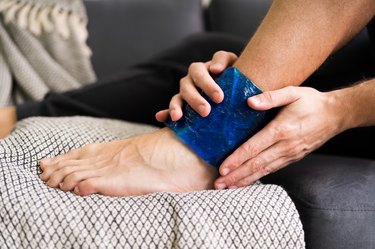
The doctors we interviewed urge people to try non-pharmacologic therapies first to deal with pain. Start with these ideas:
1. Try PRICE
Manage sports injuries using a method called PRICE: protection (tape, wraps, splints, etc.), rest, ice, compression, elevation, according to Tufts Medical Center.
2. Consider Physical Therapy
A June 2017 review in PLOS One found physical therapy is effective at reducing ongoing back, neck, shoulder and knee pain.
3. Reduce Cramps With Movement
Aunt Flo's visit got you down? Exercise can reduce menstrual pain, while heat and acupressure have a moderate effect, according to a January 2019 review in BMC Complementary Medicine and Therapies.
4. Look to Your Lifestyle
Getting enough sleep and staying hydrated may help reduce headaches, according to the American Migraine Foundation.
5. Become a Pain Detective
Discovering what's at the root of your discomfort might offer clues to solve the issue. For example, Dr. Shah recalls a period of time when he experienced recurring daily headaches at 4:00 p.m. Eventually, he realized it was because he had been skipping lunch that week. He started taking time for a midday meal, and the headaches vanished.
In another instance, he injured his knee while exercising and connected the dots to getting lax on stretching before a workout.
"Pain is a reminder to be cognizant of what's going on in your body," Dr. Shah says.
This Is the Safest OTC Pain Med
If these home remedies don't work and you do want a pain reliever, which should you reach for?
"Personally, I would turn to acetaminophen, or Tylenol — it doesn't have cardiovascular, GI or renal side effects and is quite safe, as long as you don't have liver disease," Dr. Shah says.
Tylenol's primary side effect is liver toxicity, but that usually occurs in doses of more than 3,000 to 4,000 milligrams a day, according to Harvard Health Publishing.
"That said, if you know what medication works best for you, it's fine to go straight to what is effective," Dr. Shah says.
After a few hours, if the pain persists or worsens, seek medical help instead of upping your dose beyond the recommended amount.
So, How Bad Is It Really to Take NSAIDs Regularly?
As long as you're taking painkillers under a doctor's supervision, it's probably OK. (Depending on your situation, your doctor might give you a prescription for a different medication or dose.)
"I have patients who take an NSAID every single day," Dr. Cryer says. "But chronic use must be managed by a professional to reduce the risk of an adverse reaction."
Translation: Don't DIY your own medical care.
If you haven't had that conversation with your doctor, then taking pain meds continuously is pretty dangerous.
"I would suggest that you definitely get in touch with a doctor for blood work within a few days, since there are so many potential side effects," Dr. Shah says.
"Moreover, taking NSAIDs daily indicates there is a pain that is not being addressed. You need to explore why you need to take those medications so frequently in the first place."
- CDC: "Delay or Avoidance of Medical Care Because of COVID-19–Related Concerns — United States, June 2020"
- Pharmacoepidemiology & Drug Safety: "Exceeding the daily dosing limit of nonsteroidal anti‐inflammatory drugs among ibuprofen users"
- Harvard Health Publishing: "Are you taking too much anti-inflammatory medication?"
- FDA: "FDA Drug Safety Communication: FDA strengthens warning that non-aspirin nonsteroidal anti-inflammatory drugs (NSAIDs) can cause heart attacks or strokes"
- American Family Physician: "Cardiovascular Effects of NSAIDs"
- BMC Complementary Medicine and Therapies: "The effectiveness of self-care and lifestyle interventions in primary dysmenorrhea: a systematic review and meta-analysis"
- American Migraine Foundation: "Non-Pharmacological Approaches to Migraine Management – Facebook Live Recap"
- FDA: "FDA recommends avoiding use of NSAIDs in pregnancy at 20 weeks or later because they can result in low amniotic fluid"
- Pain Reports: "Preventing and treating medication overuse headache"
- FDA: "Treating Migraines: More Ways to Fight the Pain"
- PLOS One: "Effective treatment options for musculoskeletal pain in primary care: A systematic overview of current evidence"
- Fortune Business Insights: "NSAIDs Market to Reach USD 24.35 Billion by 2027; Rising Geriatric Population Worldwide to Augment Growth"
- FDA: "Motrin® Ibuprofen Tablets, USP"
- Mount Sinai: "Peptic ulcers"
- Tufts Medical Center: "PRICE: Protection, Rest, Ice, Compression, and Elevation for Injuries"
- Harvard Health Publishing: "Acetaminophen safety: Be cautious but not afraid"
Is this an emergency? If you are experiencing serious medical symptoms, please see the National Library of Medicine’s list of signs you need emergency medical attention or call 911.

